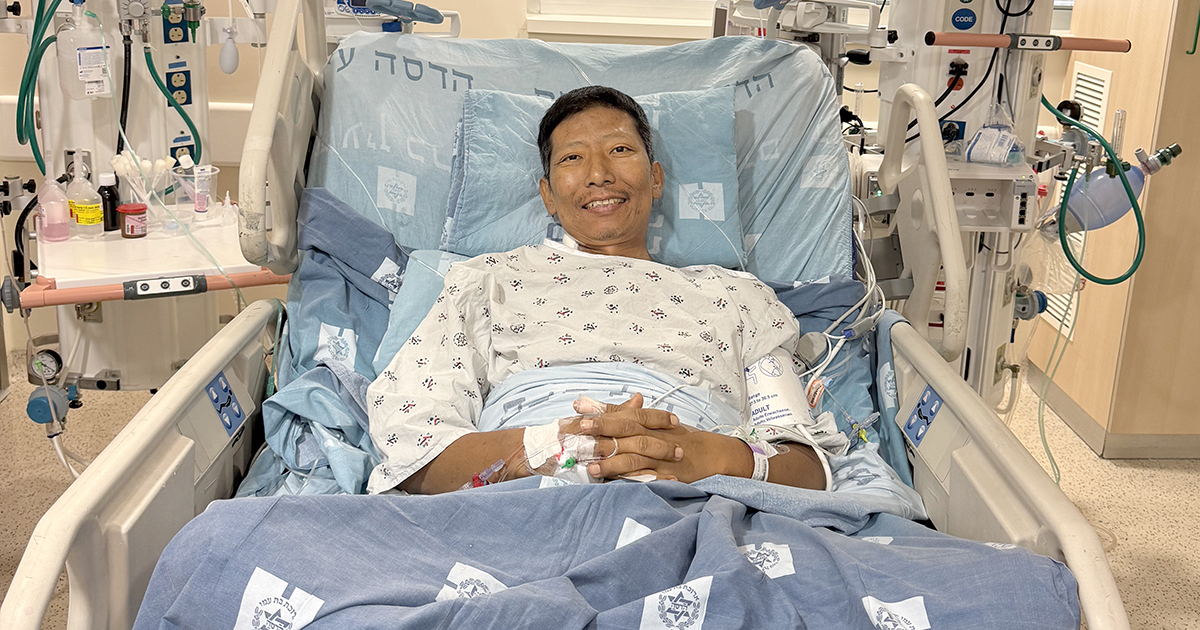Doctors at Hadassah Hospital Ein Kerem successfully performed, for the first time in Israel, cardiac bypass surgery immediately followed by a liver transplant.
Shneor Kipgan, 44, has made medical history. After undergoing complex cardiac bypass surgery, he then — that same night — underwent a lifesaving liver transplant. This unprecedented surgical event in Israel has been conducted in only a few leading hospitals worldwide and requires medical and logistical preparations and the highest level of team commitment.
The surgery was performed as part of a marathon of liver and kidney transplants that took place during Sukkot. Four patients were saved, two of whom underwent a liver transplant and two of whom underwent a kidney transplant.
"The patient would not have been able to undergo liver transplant surgery if it were not for the complex bypass surgery he underwent by the staff of the Department of Cardiothoracic Surgery,” said Dr. Abed Khalaileh, director of the Solid Organ Transplant Unit, who led the operation. “On the other hand, he would not have survived without the liver transplant. His life was saved in one night, in two different operating rooms."
Dr. Khalaileh described a very tense and intense day, which spread over several operating rooms, sometimes at the same time, as the team made its way from one operating room to another, completed a procedure and hurried to prepare for the next procedure.
"It was a courageous medical decision, based on rare international experience and on top-notch medical teams. We decided that if it succeeded in a few cases internationally, we would succeed here as well — at Hadassah with our excellent staff."
Kipgan, a married father of four from the community of Ofra, suffered from liver cirrhosis.
“I never thought my medical condition would reach such a stage,” Kipgan said. “When they told me I needed a transplant, I was a bit scared. After all, it’s not a simple thing.”
Dr. Ashraf Imam, head of the Liver Transplant Service, explained that the cirrhosis from which Shneor suffered is a condition caused by a chronic illness that leads to scar tissue gradually replacing healthy liver cells, severely impairing liver function and posing a life-threatening risk.
In recent years, Kipgan’s condition had deteriorated significantly. “He became very weak, and about a year ago, we were told he needed a liver transplant,” his wife, Shoshana, recalled emotionally.
His medical situation grew even more complicated when, about a year ago, during routine tests conducted at Hadassah hospitals in preparation for the liver transplant, doctors discovered that he was also suffering from blockages in his coronary arteries and that he required immediate heart bypass surgery.
The cardiac surgery was performed by a team from the Department of Cardiothoracic Surgery led by Dr. Amit Korach, while a team of surgeons from Hadassah simultaneously performed liver harvesting surgery at Rambam Hospital. The liver was rushed to Hadassah; at 4 am, following the completion of the complex cardiac bypass surgery, the successful transplant surgery began.
"Shneor suffered from narrowing of the arteries that supply blood to the heart, a decidedly life-threatening condition, in which it is not possible to undergo a liver transplant before operating on his heart,” Dr. Korach explained.
“In bypass surgery, we take blood vessels from different parts of the body and bypass the blocked arteries. The fear of performing the two surgeries one after the other stems first and foremost from the fact that they are two major surgeries on a patient with severe liver failure. His liver was practically dysfunctional, including a severe impairment in the ability to produce blood clots and stop bleeding."
Dr. Korach added that the need for heart surgery was discovered in a routine evaluation done before liver transplant surgery. "The decision to have a combined surgery was made in a multi-team discussion that included transplant surgeons, heart surgeons, cardiologists, anesthesiologists and specialists in liver medicine.
Before the surgery, all the teams were meticulously prepared, including with a list of "non-routine events and equipment" distributed among the surgeons about six months ago.
The main concern leading up to the surgeries stemmed from the unknown, since this combined surgery has been performed very few times anywhere.
The medical drama did not end there. The team of surgeons from Hadassah who performed the liver harvesting at Rambam then rushed to Assuta Hospital in Ashdod, where they performed another liver harvesting operation for another patient who was waiting for a lifesaving transplant.
At 8 am, the second liver transplant was performed at Hadassah on a 50-year-old resident of the north. Dr. Imam said, "The process was so complex but worth all the effort to save lives and give patients renewed strength."
Later in the day, the team also performed two kidney transplants: one on a 55-year-old woman who has been dealing with complex chronic diseases for years and the other on an 83-year-old man. All the transplants were performed in just 24 hours, requiring supreme effort and precise synchronization between all teams at Hadassah, the other hospitals and on the country's roads. The surgeries were completed successfully, and all the patients are recovering well.
"This was an unprecedented medical operation, which required perfect coordination between dozens of staff members — doctors, anesthesiologists, nurses, technicians, logistical staff and the National Transplant Center,” Dr. Khalaileh said. “Four people were saved thanks to professional, dedicated and precise work, carried out around the clock without stopping even for a moment. I am proud of our teams and thank everyone who took part."



.svg)







